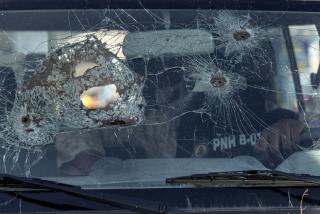Troops Warned of Substantial Danger
- Share via
WASHINGTON — When they enter Kosovo, NATO’s 48,000 peacekeepers will face the kinds of danger they long trained for and take on vexing tasks of administration and civil law enforcement most would just as soon avoid.
As they enter the province behind retreating Yugoslav forces, they will face land mines, booby traps and perhaps sniper fire. And until a new civil authority takes control of the devastated province--nobody knows when--they also will break up fights, make laws and oversee mundane tasks such as traffic control.
U.S. officials warn that the dangers of policing the international protectorate will be substantial. And, remembering the unhappy experience of peacekeepers in Bosnia-Herzegovina, who were stuck with administrative jobs for many months, they are prodding the United Nations and private aid groups to start organizing the new civil government as soon as possible.
So far, the U.N. has yet to name the figure who will be the senior civilian representative in Kosovo, a province of Yugoslavia’s larger republic, Serbia.
“This is going to be difficult: I don’t think anyone should minimize the hardship in this particular operation,” Defense Secretary William S. Cohen said Thursday. He added that the Clinton administration wants to see the “civil implementers” organize the governance of Kosovo as quickly as possible “so the military does not have to do that.”
Officials say the physical dangers in Kosovo will come from several sides. The Yugoslav forces carpeted many areas of the province with land mines and booby-trapped bridges, especially in the southern end of the province, to slow down the NATO ground invasion that never came.
The Yugoslav military has agreed to supply maps of where the land mines have been laid. But officials acknowledge that those maps may not be complete. And in a briefing Thursday, Cohen acknowledged reports of Yugoslav troops laying additional land mines and torching homes as they exit the province.
Some NATO authorities have voiced concern that Yugoslav soldiers and police might strip off their uniforms and stay behind as guerrilla fighters. There also is a risk that the Serbian civilians in Kosovo, who number between 100,000 and 200,000, will clash with returning ethnic Albanians who were driven from the province by Yugoslav forces. Ethnic Albanians made up about 90% of the province’s 2 million people before the conflict began.
Gen. Charles Krulak, the retiring U.S. Marine commandant, said in an interview that he fears the peacekeeping task may bring the kind of casualties that the 11-week
air campaign miraculously avoided.
“Peacekeeping is tough,” Krulak said. He cautioned that Marines may find themselves in the middle of a civil war that their training has not prepared them to handle.
“You’re asking some 19-, 20-, 21-year-olds in the middle of some blown-up province to be making decisions on who lives where, and how they’re to be separated, and how you manage to keep some kind of peace,” he said.
The Marines and the American public need to understand that peacekeeping “is no cakewalk,” Krulak said.
President Clinton, in a televised address Thursday, also warned that the peacekeeping mission may bring the first casualties of the campaign. (Two U.S. pilots were killed in Albania when their Apache helicopter crashed during a training exercise.)
Other officials have pointed out that in some ways this job may present less risk than some other recent peacekeeping assignments: In Bosnia, for example, peacekeepers had to physically separate Bosnian Serb and Muslim soldiers in a way that will not be required in Kosovo. And some analysts predict that the great majority of Serbs will depart, fearing retribution by returning ethnic Albanians and uncomfortable at the prospect of living as an even smaller minority in the province than before the war.
Yet there may be substantial turmoil in the province even if they do leave. Many of the returning refugees have little left after a Yugoslav campaign that burned homes in 500 towns; some do not have deeds or other papers to prove that they own the property they left behind.
“There could be fights over houses--there could be riots over food,” said Ivo Daalder, a former U.S. national security advisor. The situation could be explosive, he said, if the “rising expectations of returning refugees are unmet.”
There have already been reports of widespread hunger among the hundreds of thousands of ethnic Albanians who remained in the province. NATO officials, concerned about their plight, are considering air drops of food once Yugoslav air defenses have been removed.
Brian Atwood, head of the U.S. Agency for International Development, said there also is a possibility that citizens of neighboring Albania, the poorest country in Europe, may drift across the border and try to squat on properties in Kosovo, despite the devastation. “We will undoubtedly have some disputes,” he said in a radio interview Thursday.
NATO officials say the peacekeepers, including 7,000 Americans, will seek to establish an evenhanded law and order and make enough improvements to the province’s infrastructure to enable them to do their job. But they don’t intend to rebuild homes or other structures.
The force will “provide a basic level of law and order,” said Lt. Gen. Mike Jackson, senior commander of the Kosovo Force, or KFOR. “And I stress basic: It will take some time before we can get conditions back to anything like normal.”
According to Daalder, the U.N. personnel and relief agencies are likely to spend most of their effort on meeting the most urgent needs--food and shelter. And that leaves the tasks of administration and law enforcement to the peacekeepers, like it or not, he said.
*
Times staff writer John J. Goldman at the United Nations contributed to this report.
More to Read
Sign up for Essential California
The most important California stories and recommendations in your inbox every morning.
You may occasionally receive promotional content from the Los Angeles Times.














